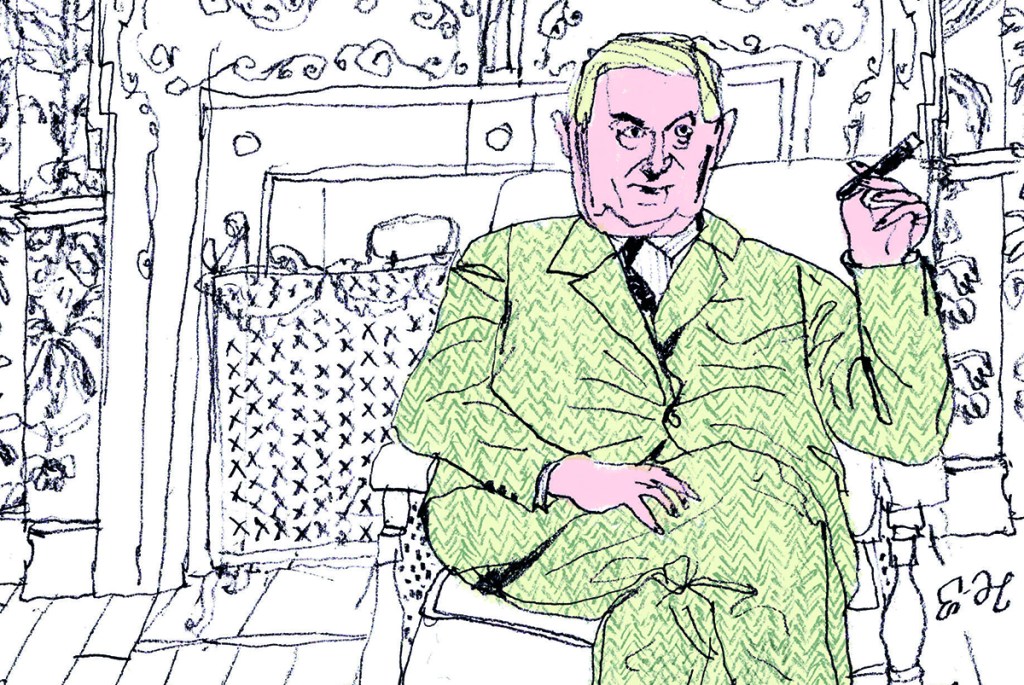Evelyn Waugh is popularly known today as a comic author, despite the fact that Brideshead Revisited, made famous by the eponymous 1981 television series, is certainly not a comedy. Not everyone agrees. Years ago, a well-read friend of mine remarked to me that he was not fond of Waugh’s work. When I asked why, he replied, ‘Because I don’t think he’s that funny.’ I answered that the way to appreciate the exquisite wit of Evelyn Waugh is to approach him in the expectation of something other than humor, in which case the absurd incongruities, outrageous juxtapositions and ludicrous extremes that occur throughout the novels are in fact supremely funny.
Waugh never set out to write comedic stories in the manner of P.G. Wodehouse (whose work he admired enormously), though his own comic prose is no less accomplished than Wodehouse’s. Instead, he aimed for higher intellectual achievements. His preoccupations as a novelist, a travel writer, and a critic are a series of oppositions: order vs chaos and anarchy, civilization vs barbarism, and civility vs incivility, all set in the 20th-century world. Due to his assured grasp on Western history, his extreme sensitivity to contemporary social and intellectual movements and — dominating all — his Catholic faith, Waugh was acutely aware of the fragile nature of civilization, which he saw as a man-made haven threatened by an aggressive encompassing wilderness relentless in its determination to take back its own.
While he deals most directly with this theme in Robbery Under Law — less a travel book than a sophisticated historical disquisition written following his return from a brief sojourn in revolutionary Mexico in 1938 — the concept of civilization under never-ending siege underlies all of his novels, which he succinctly described as ‘the creation of small independent systems of order’.
His fiction reflects a fundamentally disordered society in which western culture and history have become objects of intense boredom on the one hand, and misunderstanding and ignorance arising from social and historical illiteracy on the other. Waugh believed the civilization of the West the only civilization worthy of serious attention but never claimed, however, that westerners are inherently superior to non-westerners. He achieved many of his finest comic effects by juxtaposing differences (often superficial ones) in customs and manners between Europeans and barbarians. Yet it is not always the Europeans to whom he gives the advantage.
Some of the most hilarious parts of Black Mischief, for instance, recount the efforts of Seth, Emperor of the island kingdom of Azania, to ‘modernize’ his country by aping European progressivism — organizing a Pageant of Birth Control in which native mothers on parade push empty baby carriages ahead of themselves, and so on. Whether or not Waugh thought African societies capable of producing Mont-Saint-Michel or La Divina commedia, he certainly believed people of color worthy and competent in priestly service to the Church and to the world, including missionary work in savage countries.
In his short story ‘Out of Depth’, a pair of larking and drunken young toffs are injured in a midnight auto crash and transported to the 25th century. Historical London has crumbled into ruins and its half-human inhabitants dwell in huts fashioned from reeds and supported by poles along the banks of the Thames. Civilization is rescued by African priests, who arrive by steamship and construct mission houses to catechize the natives.
Evelyn Waugh’s novels fall into two creative periods, a Dionysian and an Apollonian one. The first includes Decline and Fall, Vile Bodies, Black Mischief, Scoop and Put Out More Flags; the second Work Suspended, Brideshead Revisited, Scott-King’s Modern Europe, The Loved One, Men at Arms, Officers and Gentlemen, and The End of Battle. The pivotal work here is A Handful Of Dust (in my opinion his best book), which comes chronologically between Black Mischief and Scoop. The early novels convey Waugh’s marvelously mad impressions of a hectic and irresponsible world, futile in its febrile, directionless and nihilistic hyperactivity and wholly untethered from reality, as well as from history. It is a world with which Waugh felt some affinity and to whose siren call he partially succumbed in his youth, before his conversion to the Church of Rome and marriage to his second wife, Laura Herbert, an aristocrat by whom he had seven children.
The novels from the later period, beginning with Brideshead Revisited, are more restrained and less comedic. They are classic in form and chaste in style. They represent a striking departure from the rapid, kaleidoscopic technique, which employed frequent sentence fragments and other discontinuities, that he adapted from the cinema (‘the modern way to tell a story’) — of his earlier ‘literary’ fiction. Brideshead, indeed, is romantically nostalgic, even ‘plummy’, to the point of sentimentality. Waugh, who wrote the book while on leave from the army during World War Two, later concurred with this judgment. He had been suffering, he decided, during the weeks of its composition from his wartime deprivation of civilized society and the sybaritic pleasures of civilian life. Hence its evocation of ‘drowning in honey’.
Nevertheless the quality of his work declined markedly after that. The later novels lack the feline wit, black humor and zany surrealism of the earlier books that make them vintage Waugh. The incomparable achievement of A Handful of Dust results from its success in combining elements of his Dionysian and Apollonian phases. Its pitch-black comedy begins with acutely observed social climbing, continues into a description of an adulterous love affair and tragic death, and concludes with its protagonist captured by a madman who forces him to sit aloud reading the works of Dickens. It remains unique in Waugh’s canon, and in 20th-century English literature, in the readers’ never entirely knowing what their reaction should be to it. It is, and remains, inimitable.
Evelyn Waugh was unquestionably among the greatest novelists of the 20th century. He was not, however, one of the finest travel writers of any time. Certainly he was no match for Charles Doughty, Sir Richard Burton, T.E. Lawrence, Wilfred Thesiger or Sybille Bedford, a contemporary whose The Sudden View: A Mexican Journey is far superior to Waugh’s Robbery Under Law. Unlike those writers, Waugh is never a participant in the scenes he describes in suffocating detail. One can imagine contemporary readers setting the travel books aside and waiting for the ensuing and far superior novel that his adventures produced. Yet Waugh was a superb literary critic. His notice of Graham Greene’s The End of the Affair, for example (which he adored) is in itself a work of art: ‘Again and again Mr Greene has entered fully into a scene of high emotion which anyone else would have shirked.’
Predictably, Evelyn Waugh disliked America and most Americans. He expressed his distaste with savage relish in The Loved One and greatly resented having to meet with ‘the Yank’ Edmund Wilson when Wilson made a visit to England. On one occasion, irritated by what he considered a fawning admirer of Brideshead, Waugh turned on her: ‘I thought it was pretty good myself, but now that I know that a vulgar, common American woman like yourself admires it, I am not so sure.’ Another time, asked how he could reconcile his rude and insulting behavior with his religion, he replied, ‘You have no idea how much nastier I would be if I was not a Catholic. Without supernatural aid I would hardly be a human being.’
It is a tenet of Catholic belief that true faith is true happiness. Waugh, despite his own unquestionable faith, was not a happy man. Toward the end of his life, he was miserable most of the time. ‘Papa,’ his daughter and favorite child Meg once asked him, ‘why are you so unhappy?’ He was unable to answer. No doubt his perception that Great Britain — and with it the civilized world — had declined steeply in his final years had much to with his depression. So did Vatican II that concluded in 1966 after ‘buggering up… the Mass’, as he put it. Recent speculation suggests Waugh’s state of mind verged on madness before his death.
Still, the manner of his end became the man. Waugh died after hearing Mass on the afternoon of Easter Sunday, April 10, 1966, locked in the WC and seated on the toilet. His own black humor was never quite so black as that.
This article was originally published in The Spectator’s November 2021 World edition.

























